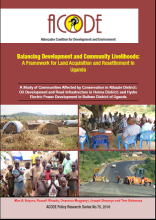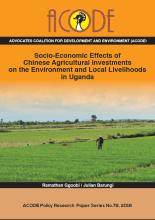/ library resources
Showing items 1 through 8 of 8.Land acquisition for development projects by government, private investors and land speculators is a critical source of tensions and conflicts in many parts of Uganda.
This gender study forms part of the International Land Coalition’s ‘Commercial Pressures on Land Initiative’ Global Study.
The 1995 Constitution of the Republic of Uganda is one of the most gender sensitive constitutions in the world, with clear provisions for promoting and protecting the rights of women.
The nature and significance of China's engagements with African agriculture continues to be hotly debated in the media, academia and policy circles around the world.
Uganda discovered commercial quantities of oil in the country in 2006 and ever since, there has been increased activity in the exploration of oil and gas.
Equitable access to land is vital for inclusive economic growth, sustainable development and food security. Although much is known about the topics of land governance and food security, it is not always clear how the two relate to each other, especially in specific country contexts.
Food security in Uganda relies mainly on access to land and security of tenure. Land governance is marked by the contradiction between relatively progressive legislation and only partial implementation.
The ways in which people obtain land in Uganda are changing fast. Land that used to be secured through inheritance, gifts or proof of long-term occupancy is now more commonly changing hands in the market.
Land Library Search
Through our robust search engine, you can search for any item of the over 73,000 highly curated resources in the Land Library.
If you would like to find an overview of what is possible, feel free to peruse the Search Guide.






